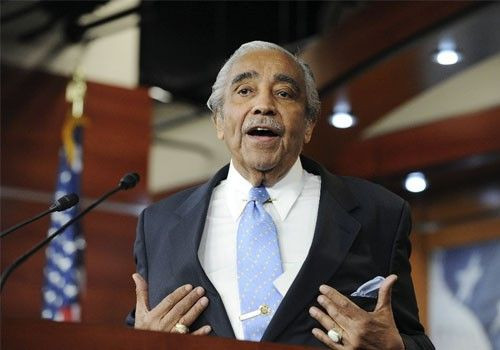Defiant Rangel censured by House for ethics violation

Disgraced Rep. Charles Bernard Rangel (D-N.Y.) has been censured by the U.S. House of Representatives for ethics violation but narrowly escaped expulsion.
Rangel, who was forced to stand in the well of the House on Thursday, faced a humiliating rebuke from House Speaker Nancy Pelosi (D-Calif.), who read a brief statement outlining his misconduct. Pelosi also said Rangel should make restitution for any unpaid taxes.
Throughout the censure, Rangel remained calm and he apologized to the House for his violations. However, he also told the House that he did not deserve censure and felt that politics, and not facts, drove its decision to censure him.
The vote for censure was a very, very, very political vote, Rangel told reporters afterward. There's no evidence that I did anything to enrich myself or that I did anything corrupt.
The House had voted 333-79 in favor of censuring Rangel. It was the 23rd House censure and the first in 27 years. In 1983 two congressmen were rebuked for sexual misconduct with House pages.
Last month the House of Representatives Ethics Committee found Rangel guilty on a 9-1 vote and recommended that he be censured.
The congressman's troubles began in July 2008 when the media reported that he had used rent-stabilized apartment as a campaign office, had failed to pay taxes on rental income from the Caribbean villa and had concealed information of over $500,000 in assets on his financial disclosure forms.
As his personal finances were scrutinized in the months that followed, Rangel, who resigned as the chairman of the tax-writing Ways and Means Committee, was also accused of improperly raising funds for a City College of New York building to be named in his honor as he had used Congressional stationery and staff, sought donations from corporations with business before his committee and helped extend a tax loophole worth hundreds of millions of dollars for an oil company at the same time he was asking for a $1 million contribution from its top executive.
Rangel, who has represented Harlem for 40 years and won a 21st two-year term with 80 percent of the vote in the November 2 election even as his fellow Democrats lost control of the House to Republicans, had appealed to his colleagues to back a reduced punishment of a written reprimand as he felt his violations did not deserve a censure, which is reserved for the worst forms of corruption.
The congressman is well liked by his constituents as he is a decorated veteran of the Korean War, a former U.S. prosecutor, a civil rights advocate and founding member of the Congressional Black Caucus.
Before the House vote on Thursday, Rangel told House members that he made serious mistakes but urged the House to be guided by fairness.
Several congressmen, including Rep. Bobby Scott (D-Va.), Rep. Lynn Woolsey (D-Calif.). Rep. Don Young (R-Alaska) and Rep. Peter King (R-N.Y.), had urged the House to treat Rangel leniently i.e. reprimand him instead of censuring him.
However, the House rejected an amendment to reduce the punishment to reprimand by 267-146.
Rep. Zoe Lofgren (D-Calif.), who chairs the ethics panel, said it was painful to discipline a colleague.
However, it was Rangel's accumulation of actions that violated the public trust and tipped the scale toward giving him the more stringent penalty, Lofgren said.
It brought discredit to the House when this member with great responsibility for tax policy did not pay his taxes, she added.
© Copyright IBTimes 2024. All rights reserved.





















